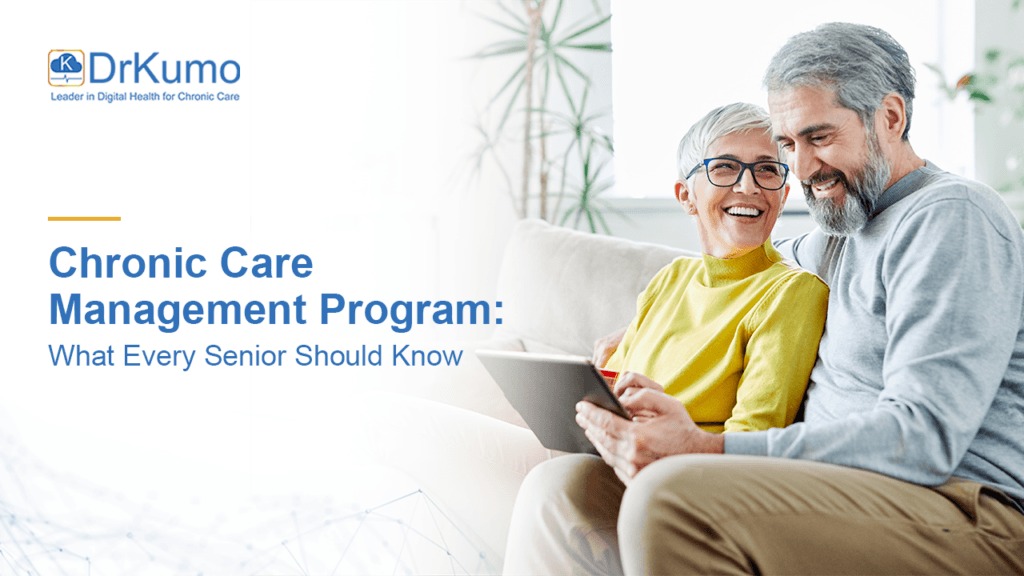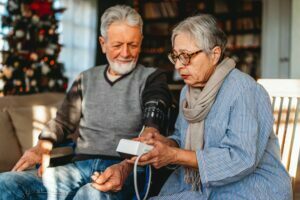Chronic disease management for elderly populations has become a critical focus of modern healthcare. With the rise of chronic conditions, elderly care management programs ensure that seniors receive ongoing support, minimizing the number of hospitalizations and improving quality of life.
A well-designed chronic care management program coordinates healthcare providers, patients, and caregivers to provide proactive care. This article will explore chronic care for seniors, including the benefits of chronic care management, eligibility, and how Remote Patient Monitoring (RPM) and digital health solutions are revolutionizing senior care.
What is Chronic Care Management (CCM)?
Chronic care management for seniors involves continuous medical services for patients managing two or more chronic conditions, such as diabetes, hypertension, or heart disease. Seniors in senior health programs like CCM receive a personalized care plan tailored to their long-term health needs. The objective is to enhance well-being through chronic care coordination, medication management, and routine follow-ups, ensuring stability over time.
Programs like Medicare Chronic Care Management cover non-face-to-face services and virtual consultations, preventing complications by monitoring patient health outside hospital settings. Through telemedicine monitoring and remote healthcare monitoring, seniors have access to care when they need it most, without the hassle of frequent clinic visits.
The Growing Need for Chronic Disease Management for the Elderly
Chronic conditions like diabetes, hypertension, and arthritis are widespread among older adults. According to the Centers for Disease Control and Prevention (CDC), about 6 in 10 adults in the U.S. have at least one chronic disease, while 4 in 10 have two or more.
According to the National Council on Aging, the prevalence of chronic illness is exceptionally high among older adults, with nearly 95% of seniors experiencing at least one chronic condition and 80% managing multiple health issues. This underscores the critical need for effective chronic disease management in aging populations.
According to Health Affairs, the demand for senior care management is projected to increase significantly as the population ages. The report highlights that by 2030, an estimated 73 million Americans will be 65 or older, driving a substantial rise in the need for coordinated care and support services for seniors.
Who Can Benefit from Chronic Care Management?
Seniors with at least two chronic conditions qualify for chronic disease management for elderly programs under Medicare. Chronic illnesses like arthritis, diabetes, COPD, and congestive heart failure can severely limit daily activities if not monitored effectively. The benefits of chronic care management include fewer hospitalizations, improved medication adherence, and better coordination among healthcare providers.
Patients with the following conditions are often enrolled in chronic care for seniors programs:
- Hypertension
- Chronic Obstructive Pulmonary Disease (COPD)
- Type 2 Diabetes
- Osteoarthritis
- Congestive Heart Failure
For those managing these conditions, senior care management is essential to ensuring both physical and emotional well-being.
Key Elements of a Chronic Care Management Program
A comprehensive chronic care management program includes multiple elements to promote continuous, connected care:
- Customized Care Plans
Care providers work closely with seniors to develop personalized care plans, which evolve based on the patient’s health status and include medication schedules, nutrition advice, and monitoring guidelines for chronic conditions. - Remote Patient Monitoring (RPM) Services
Remote health monitoring allows healthcare providers to monitor patients from afar using RPM devices like blood pressure cuffs, glucose monitors, and weight scales. Patient health monitoring via these tools enables early detection of potential complications. - Telehealth Monitoring and Virtual Visits
Telemedicine ensures remote medical monitoring through video consultations, helping patients manage chronic conditions without leaving their homes. Telehealth RPM solutions have become a key element in remote health management, offering 24/7 access to care. - Chronic Care Coordination Across Providers
Seniors often see multiple medical specialists. Effective chronic care coordination ensures that all healthcare providers stay informed about the patient’s status, avoiding duplication of tests and improving treatment accuracy. - Home Health Monitoring Devices and Digital Solutions
With wireless health monitoring, patients can use home monitoring devices to report vital signs in real time. Digital patient monitoring helps care teams respond promptly to abnormal readings, minimizing risks.
The Role of Medicare in Chronic Care Management
Medicare Chronic Care Management provides coverage for many seniors needing remote care monitoring services. This can help patients avoid costly emergency care by identifying potential issues early.
Additionally, remote healthcare monitoring through RPM technology allows seniors to stay connected with their healthcare providers without needing in-person appointments.
Medicare beneficiaries must sign a consent form to participate, ensuring they know the services provided and any associated costs.
How Medicare Supports Chronic Care Programs
Medicare recognizes the importance of managing chronic conditions in seniors and provides financial support through Medicare Chronic Care Management (CCM). These programs help manage chronic diseases and reduce the burden on emergency services.
According to a report by Behavioral Health News, seniors enrolled in Chronic Care Management (CCM) programs are 15% less likely to be hospitalized than those without coordinated care. This finding emphasizes the positive impact of CCM on reducing hospital admissions and enhancing patient outcomes among older adults.
Benefits of Chronic Care Management Programs for Seniors
Enrolling in chronic care for seniors programs offers several key advantages, including:
- Fewer Hospitalizations and ER Visits
According to a study published in the National Library of Medicine, continuous remote medical monitoring enables healthcare providers to intervene early, significantly reducing unnecessary hospital visits. This approach is especially beneficial for managing chronic conditions like heart failure and COPD, with research showing a 30% decrease in hospital admissions for heart failure patients and a 25% reduction for those with COPD. - Improved Medication Adherence
Remote health solutions provide timely medication reminders, helping seniors stay on track and avoid potential complications. Medication reviews are also part of the care plan to ensure no conflicts exist. - Enhanced Quality of Life and Independence
With the help of RPM services and connected health monitoring, seniors can remain independent while receiving the support they need to manage their conditions effectively. According to a study published in the National Library of Medicine, seniors participating in Chronic Care Management (CCM) programs experience significantly enhanced mental well-being, better symptom control, and improved communication with healthcare providers. The study highlights that patients enrolled in CCM programs report higher satisfaction with their care, with 85% noting improved access to services and 75% experiencing better management of chronic conditions. - Improved Health Outcome
According to research published in the National Library of Medicine, participants in programs such as the Chronic Disease Self-Management Program (CDSMP) reported significantly fewer days of poor physical and mental health. The study found that CDSMP participants experienced a 20% reduction in the number of days with poor physical health and a 25% reduction in poor mental health days, demonstrating the program’s effectiveness in improving overall well-being. - Cost Savings
According to a study by the National Council on Aging (NCOA), patients enrolled in chronic care programs achieved an average savings of $714 per person through fewer emergency visits.
How Remote Patient Monitoring Supports Chronic Care Management
Remote patient monitoring (RPM) has transformed healthcare delivery to seniors. Through remote care technology, healthcare providers can monitor vital signs in real-time and intervene when necessary. This proactive approach prevents small issues from becoming emergencies.
Remote monitoring programs use a variety of tools, including:
- RPM Devices (e.g., blood pressure monitors, glucose meters)
- Home monitoring devices (for weight, oxygen levels, or heart rate)
- Virtual patient monitoring platforms for telehealth consultations
These tools facilitate remote health management, ensuring seniors receive timely care and support. Remote health solutions also give caregivers and family members peace of mind, knowing their loved ones are under continuous observation.
The Future of Senior Health Programs and Chronic Disease Management
The growing focus on remote healthcare monitoring and digital patient monitoring indicates that RPM technology will play a crucial role in future healthcare delivery. According to Grand View Research, the global remote patient monitoring system market size was estimated at USD 5.2 billion in 2023 and is projected to grow at a compound annual growth rate (CAGR) of 18.6% from 2024 to 2030.
Health systems increasingly adopt remote care technologies to deliver cost-effective and accessible healthcare. Seniors benefit from home monitoring devices that continuously monitor their conditions, promoting independence and reducing unnecessary hospital visits.
DrKumo RPM Solution: Revolutionizing Remote Health Monitoring
DrKumo offers an advanced Remote Patient Monitoring (RPM) solution that provides patients and healthcare providers with continuous health monitoring. The platform seamlessly integrates with RPM devices to monitor vital signs such as heart rate, blood pressure, and glucose levels from the comfort of their home.
DrKumo’s solution prioritizes patient engagement by providing an intuitive mobile app where users can view their health data, receive reminders, and communicate with providers. This proactive monitoring helps prevent complications, reducing the frequency of emergency visits and hospital readmissions.
One of the critical strengths of DrKumo’s platform is its integration with telehealth services, enabling virtual consultations and timely interventions. The system uses AI-powered alerts to notify healthcare teams of abnormal readings, ensuring prompt action.
DrKumo’s RPM solution is particularly effective in managing chronic conditions and providing tailored care for patients with diabetes, hypertension, and other chronic diseases. Through connected health monitoring and RPM technology, DrKumo supports value-based care models, improving health outcomes and fostering independence among patients.
Takeaways
Chronic disease management is vital to maintaining health, independence, and well-being for elderly populations. By enrolling in senior care management programs that include Remote Patient Monitoring (RPM) services, seniors can enjoy continuous care without sacrificing autonomy.
Through telemedicine monitoring and digital health solutions, healthcare providers can more effectively control chronic conditions, preventing complications and improving quality of life.
Seniors and their families should explore the benefits of remote care monitoring options to stay proactive in managing health challenges. Medicare’s Chronic Care Management (CCM) program offers a practical way to ensure access to these essential services, providing peace of mind and fostering long-term wellness.
Start today—empower yourself or your loved ones to live healthier, more independent lives through the right chronic care management solutions. Contact us now!
Disclaimer: This article is for informational purposes only and is not a substitute for professional medical advice. Consult your healthcare provider or Medicare representative for personalized guidance on chronic care management services.









